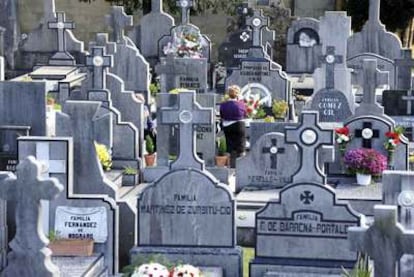Giving red tape its last rites
Reform to liberalize funerary sector and allow for burials within 24 hours
Burials in Spain are generally rapid affairs carried out within 48 hours of a death, with a separate funeral service often taking place in the days that follow. Now it seems that relatives will no longer have to wait the obligatory 24 hours to bury their deceased loved ones, when a bill recently approved by the Cabinet passes on to the statute books.
The reform, which will now be debated in Congress, seeks to make the funerary sector more transparent and competitive, and to guarantee that grieving families are able to choose the company that offers them the best price and services for their particular needs.
Spain's funerary sector has been liberalized since 1997, when private companies were allowed to break the monopoly on a market that represents a billion euros a year in a country with around 380,000 annual deaths. Yet in practice, there are still many obstacles for new undertakers, and those in operation have a hard time working anywhere else but in their own municipality.
Right now, for instance, a body may only be transported by an authorized undertaker in the town where the burial is taking place, or the location where the death took place. Opening a funeral parlor will be easier under the new law, which axes current requisites with regard to minimum personnel, number of hearses and rooms for wakes.
Besides eliminating these hurdles, the reform hopes to make prices more competitive in a sector made up of more than 1,600 registered businesses. At present, the basic costs of a burial - the hearse, the wake, the wreath and so on - are in the 1,800 to 2,000 eurorange, according to the National Funerary Service Association, Panasef.The industry is not completely at ease with the new legislation. "We agree with eliminating administrative hurdles, but not that many. We need to find some middle ground," says Carlos S¨¢nchez, Panasef's secretary, who argues that opening a funeral parlor will soon be as easy as opening a hairdressing salon.
"This could trigger the creation of intermediaries, rather than new funeral companies. And if this happens, instead of lower prices what we'll get is lower quality," S¨¢nchez adds.
One of the more practical applications of the draft law is the elimination of the requirement to keep the body at the location of death for 24 hours before transfer to the place of burial. Under the current system, if a person dies at six in the evening, he or she often cannot be buried until two days later, because at that hour the following day cemeteries are no longer open for burials."It used to be that you waited 24 hours because of Civil Registry issues, and also in case the death was not genuine. But these days, there are sufficient means to know when there is genuine brain death," say sources at the Economy Ministry. Today's technology, which can track cardiorespiratory and cerebral activity, is vastly superior to what was available 35 years ago, when the original law was enacted. The government argues the current system is "obsolete" and in bad need of reform.

Tu suscripci¨®n se est¨¢ usando en otro dispositivo
?Quieres a?adir otro usuario a tu suscripci¨®n?
Si contin¨²as leyendo en este dispositivo, no se podr¨¢ leer en el otro.
FlechaTu suscripci¨®n se est¨¢ usando en otro dispositivo y solo puedes acceder a EL PA?S desde un dispositivo a la vez.
Si quieres compartir tu cuenta, cambia tu suscripci¨®n a la modalidad Premium, as¨ª podr¨¢s a?adir otro usuario. Cada uno acceder¨¢ con su propia cuenta de email, lo que os permitir¨¢ personalizar vuestra experiencia en EL PA?S.
?Tienes una suscripci¨®n de empresa? Accede aqu¨ª para contratar m¨¢s cuentas.
En el caso de no saber qui¨¦n est¨¢ usando tu cuenta, te recomendamos cambiar tu contrase?a aqu¨ª.
Si decides continuar compartiendo tu cuenta, este mensaje se mostrar¨¢ en tu dispositivo y en el de la otra persona que est¨¢ usando tu cuenta de forma indefinida, afectando a tu experiencia de lectura. Puedes consultar aqu¨ª los t¨¦rminos y condiciones de la suscripci¨®n digital.








































